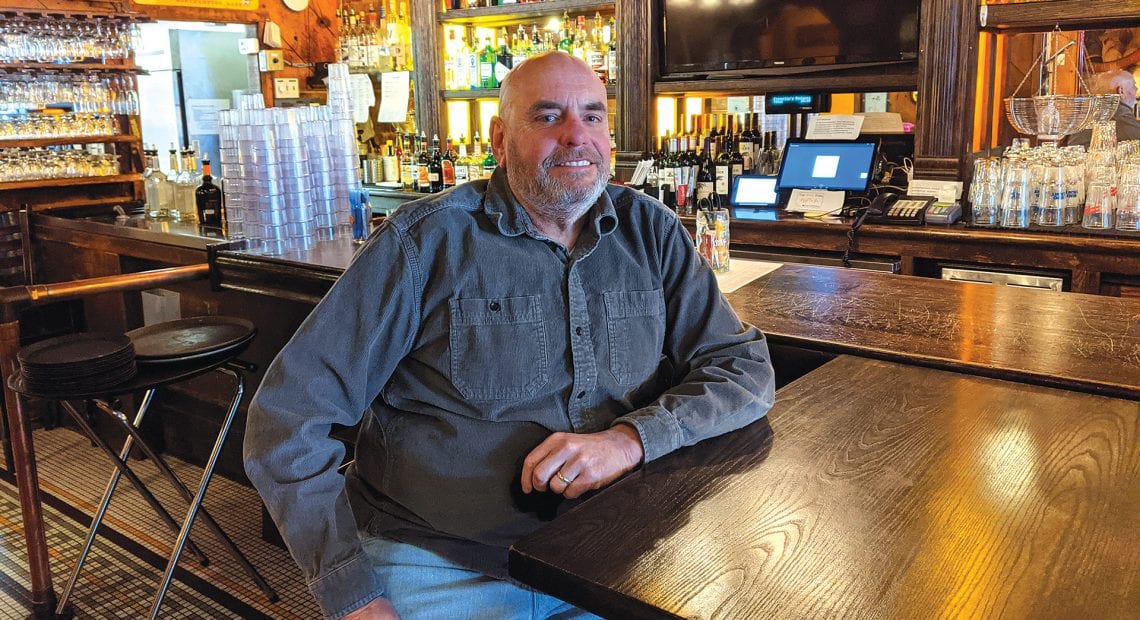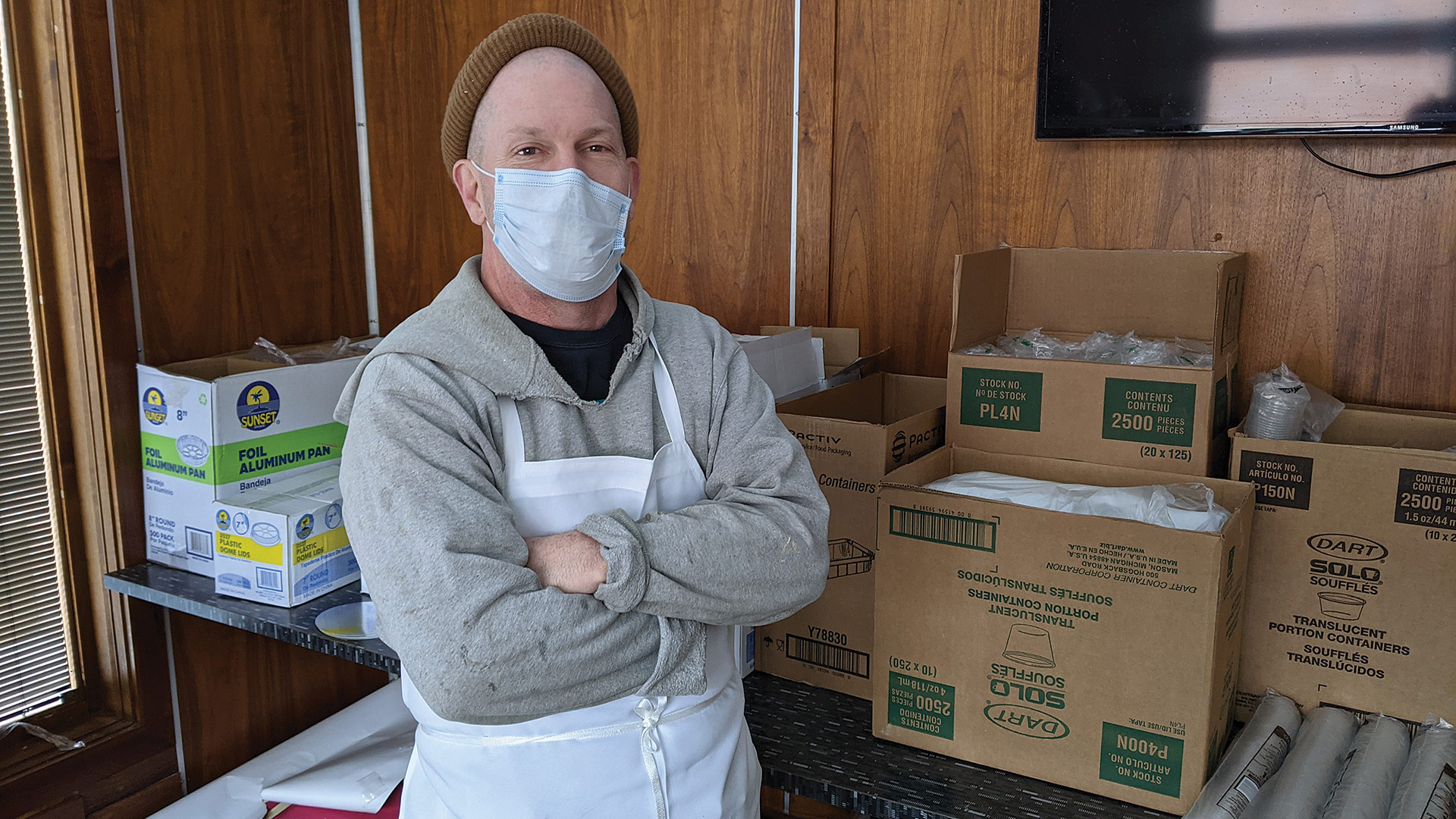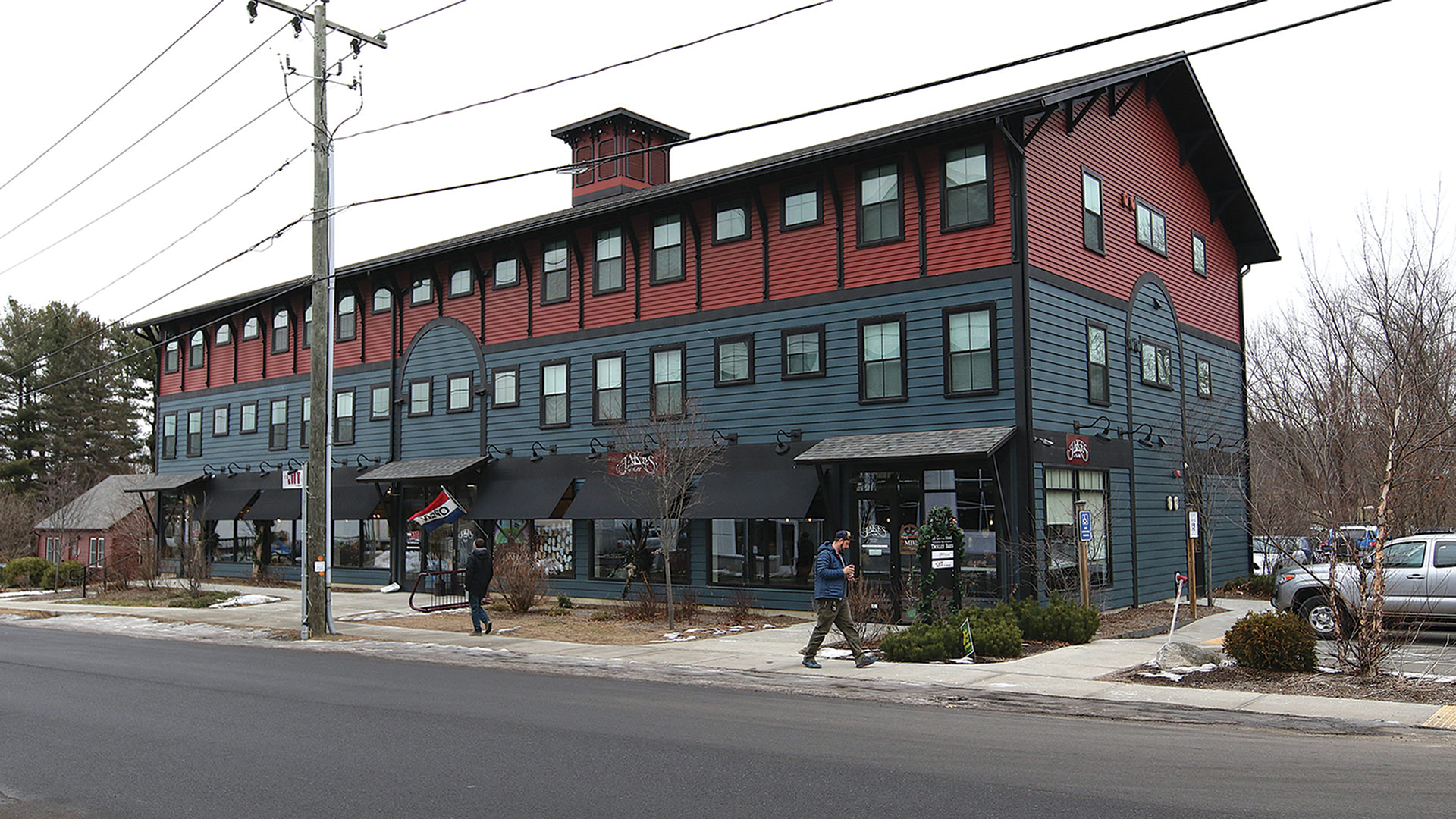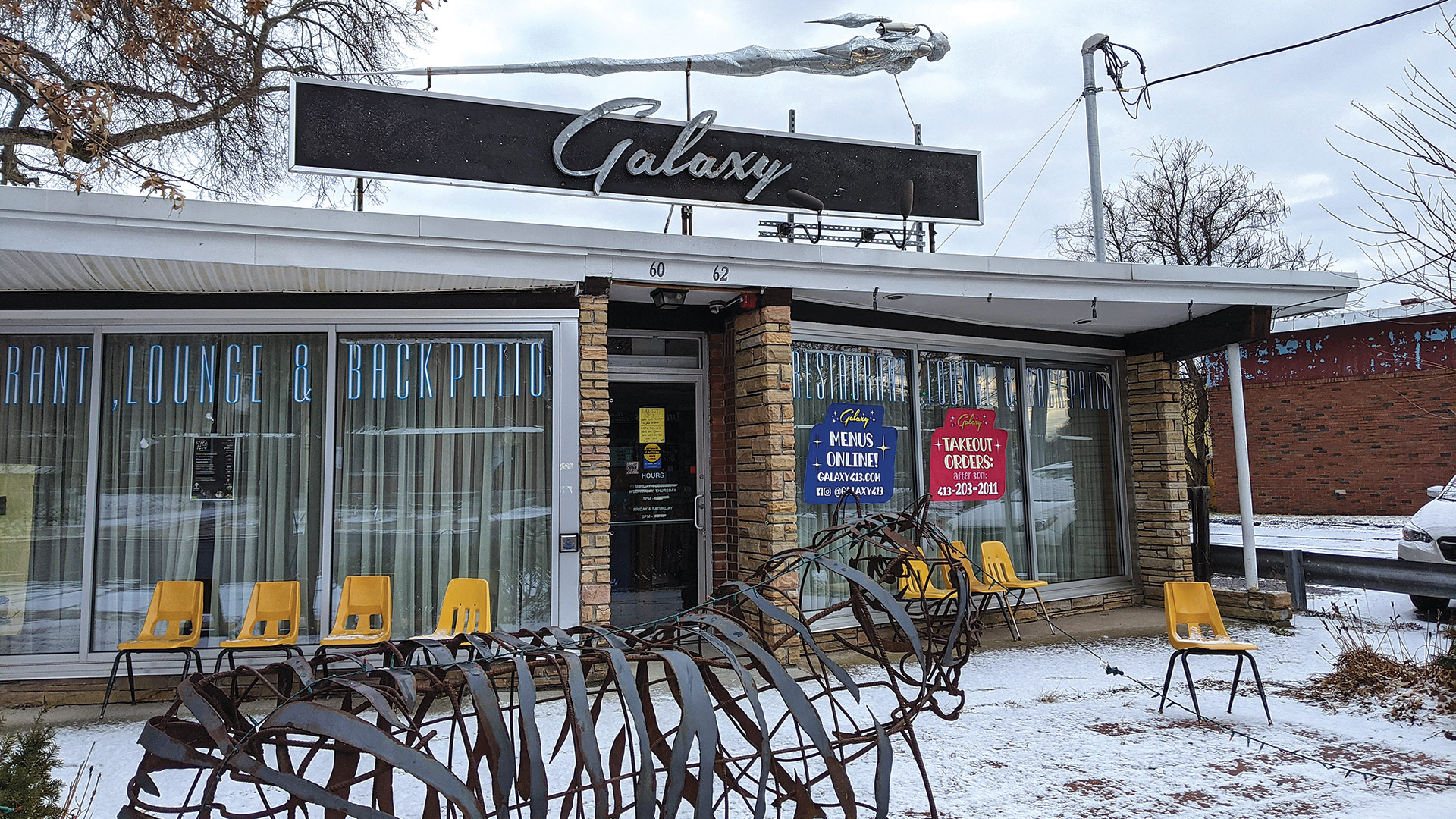
Restaurants, a Hampshire County Lifeblood, Continue to Adjust
Uncertainty on the Menu

Fred Gohr says Fitzwilly’s shifted gears in a few ways last year, from expanded takeout service to outdoor dining under a large tent.
The weekend before March 17, Fitzwilly’s was gearing up for a great St. Patrick’s Day. That’s the day the Northampton St. Patrick’s Assoc. gathers for its annual breakfast, and then about 200 of them march on down to Fitzwilly’s and spend most of the day there.
“We have Irish bands, and we were sitting on 20 kegs of Guinness beer and a couple cases of Jameson’s Irish whiskey for a great big party — and it got pulled right out from under us,” owner Fred Gohr said.
Remember March 16? That’s the day restaurants — and most other businesses in the Commonwealth — were forced to shut down, on just two days notice, by order of Gov. Charlie Baker.
“It was awful,” Gohr went on. “We had a staff of about 75 people, and I had to tell them all, ‘we’re closed, and you guys have to go on unemployment for a while, and we’ll see what happens.’”
What happened, all across Hampshire County’s robust dining scene, has been a series of starts and stops, hope and despair, and especially two themes that kept coming up as BusinessWest sat with area proprietors: uncertainty, but also evolution.
“We were closed completely for a month or so, then we opened and started doing a little bit of curbside,” Gohr said. “And, honestly, when that’s all you’re doing — at least for us — it’s not very profitable.”
But takeout service, never a major factor in the business, has since morphed into a significant part of the model, accounting for about 25% of sales. Other restaurants have relied even more on pick-up service, because they don’t have the interior space or outdoor-dining opportunities that Fitzwilly’s has (more on those later).
“Last year, it felt like you were opening a new restaurant every single week. You had no historical data to compare; you couldn’t look at sales and ask, ‘how did we do this last time?’”
“It’s been such a whirlwind for small businesses the past 10 months, trying to get our bearings with all the changes,” said Alex Washut, who owns two Jake’s restaurants in Northampton and Amherst. “Last year, it felt like you were opening a new restaurant every single week. You had no historical data to compare; you couldn’t look at sales and ask, ‘how did we do this last time?’
That’s because there was no ‘last time’ — no comparable pandemic in the past century, anyway. “Everything was out the window,” Washut said. “We asked, ‘who are we going to be this week?’ Then there was a bunch of changes, and we had to conform to those, and then it was a new restaurant the next week.”
Like Fitzwilly’s, evolving to a takeout model early on was new territory for Jake’s. “We were never a takeout restaurant; maybe 3% of our gross was takeout food,” he said. “So we had no system for it.”
The various systems that area eateries developed, in the weeks last spring when takeout was the only option, involved details ranging from what containers to use to how to present food attractively and, for restaurants that opted for delivery, how to keep it warm in transit.

Casey Douglass with some of the supplies used in Galaxy’s takeout business, which has been its dominant model for almost a year.
“We were able to pivot quickly,” Washut noted. “From there, we moved to outdoor dining when that was allowed, but we had never had outdoor dining before” — and questions had to be answered regarding permitting, staffing, health and safety factors.
The positive, he noted, is that, if 2021 follows a similarly bumpy trajectory, “we know what’s expected, and we know how we’ll react in the spring, how we’ll react in the summer, and how we’ll react once the fall and winter come along.”
Indeed, the establishments that survived last year’s storm are, if not stronger for the experience, at least a little wiser, even as many are barely hanging on. The hope, of course, is that 2021 is nothing like 2020. But in this industry, so critical to the economy and cultural life of Hampshire County, nothing is certain.
Survival of the Fittest
“We’ve evolved a lot.”
Those were Casey Douglass’ first words when asked what this year has been like at Galaxy, the restaurant he’s operated in downtown Easthampton for the past five years.
The first evolution had to do with meeting customer needs. “We’re part of the food chain,” he said. “We have a lot of customers who don’t go to the supermarket. And we were like, ‘they’re going to be putting themselves at risk going to the supermarket as opposed to getting to-go.’
“So we went to the radio station and created an ad talking about ‘Casey’s comfort food,’” he went on. “And we switched to all a la carte, basic stuff — mac and cheese, mashed potatoes, roasted chicken, meatloaf — and we were cranking.”
So much that, when he secured a Paycheck Protection Program (PPP) loan, he first thought he wouldn’t need it. “Then a couple weeks went by, and we said, ‘thank goodness we got that.’ It changed so quickly.”
Sales dropped to about 45% of what they once were, but he kept 70% of the labor on board, because that’s the main purpose of the PPP program. That money got Galaxy through the end of June. Then things got rough.

Jake’s owner Alex Washut says it might be a while before his two locations (this one in Amherst) are packed with patrons again.
After losing a couple of cooks to unemployment, the restaurant cut back from five days a week to four, and when summer rolled around, fewer customers wanted takeout, but outdoor dining wasn’t a draw, either.
Fall brought a reprieve of sorts, with the milder, less-humid weather boosting outdoor dining, but the winter has been exceptionally tricky. Indoor dining didn’t prove to be a workable option; in a space that seats fewer than 50, the governor’s current 25% capacity mandate is especially onerous, and Douglass and his team also felt indoor dining might not be safe — or, at least, feel safe — for a clientele that skews older than some restaurants.
So as winter wears on, Douglass is pressing on with takeout only — now a hybrid of the comfort-food concept and the creative American meals he’s known for — a bank loan, and plenty of grit.
“We’re just looking at survival at this point,” he said, noting that costs like food, loan interest, utilities, and equipment leases don’t just go away when sales are down. “We’re efficient at what we do, but we’re losing about $15,000 a month. And that’s not going to be able to continue.”
However, he insisted, “I do think the spring will increase sales a couple thousand dollars a week, and that’s all it takes. We’ll be fine.”
Evolving to a takeout model was jarring at first to Washut, especially since his two locations — an 1800s-era building in Northampton and a new, modern structure in North Amherst’s Mill District — are so different, with a different set of clientele, and not cookie-cutter businesses like quick-service chains.
“We’re just looking at survival at this point. We’re efficient at what we do, but we’re losing about $15,000 a month. And that’s not going to be able to continue.”
“We didn’t know how to be a takeout restaurant. We were making $50 in sales a day — we were in shock,” he recalled. So he shut things down completely through April, secured a PPP loan and other grant funds, and reopened for takeout in early May, then outdoor seating a couple months later. Armed with the PPP, he was able to bring back the whole staff, and the breakfast-and-lunch establishment added dinners to generate more business. When funds ran dry, dinner went away.
These days, with takeout and limited indoor seating, Washut is bringing in about 30% of typical sales, and the combined staff is down from close to 50 to around 15.
Throughout all the changes, he has prioritized safety. Even if the governor’s 25% seating rule changes tomorrow, he said, “I’m not going to increase my dining room beyond 25%; my staff and I don’t feel that’s appropriate right now. There may be things we’re allowed to do but, in reality, we choose not to do.”
Gohr had a few advantages last year when it came to keeping people safe while generating business. One was a large parking lot next to Fitzwilly’s that he rented from its owner for tented outdoor dining. He could seat 70 there, while the city of Northampton’s decision to turn parking spaces on Main Street into dining space added about eight more tables to the restaurant’s existing sidewalk seating.
“We really had a great summer,” he told BusinessWest. “Through the summer, we had a capacity of 100-plus guests, the majority of them outdoors.”
Gohr’s other advantage is a large indoor space with a normal capacity of 280. The 25% mandate has hurt this winter, for sure, as did Baker’s 9:30 p.m. curfew, which was only recently lifted. But seating 70 — separated by plexiglass barriers — is better than seating a dozen.
“We’re very fortunate to have a lot of room in here, and we’re able to distance people. These places that have even 50 seats — and there’s a lot of places in town with just six tables — but even the ones with 50 seats, now you’re down to letting 12 people in. You can’t survive. So we’re fortunate given the size we have. Seventy people gets us by. We can survive on that if it doesn’t change.”

Casey Douglass is confident Galaxy will return to its go-to dining status in Easthampton once it’s safe to eat out again.
A mild winter, weather-wise, helps as well. “If you start getting snowstorms on weekends on top of all the other stuff, then we’d be in trouble. But we’ve had pretty good weekends.”
A PPP loan and other grants also helped, and he’s applied for a second PPP loan, with this round capping the disbursement for certain hard-hit industries, including restaurants, higher than the first, so he’s hopeful for another influx to carry him to the spring. He’s already in talks about renting the parking lot again, and the city has discussed moving outdoor seating into Main Street again as well.
Pressing Through
Still, Gohr, like every other restaurant owner, knows 2021 could be another year of upheaval. “We’re hoping everyone gets the vaccine and we get back to normal. But I don’t think it’s going to be real quick.”
He’s appreciative of customers eating in the restaurant, and said gift-card sales were strong over the holidays, although not to the level of a typical year, when more people are out shopping. And he does believe outdoor dining will be a hit again. But it’s harder to pin down when customers will flock to restaurants at pre-2020 levels.
“My gut tells me it’s not going to be in the spring; it’ll be late summer or fall before we get to that point,” he said. “The mindset that I see in the public is all over the place. I know people — friends and some of my regular customers — that have not been anywhere since March. And then there are others, the minute we opened the doors, they were back. Everybody’s obviously more careful, but everyone’s comfort level is completely different. It’s a wide spectrum.”
Douglass senses real community support for Galaxy, noting that some regulars stop by three times a week, and others drop big tips and cheerlead for the establishment among their peers.
“I feel like, at least in this community, [the pandemic] hasn’t hurt on a big scale economically,” he said. “We haven’t had factories shut down. I’ve heard people are paying their rents. And I think, come the spring, people are going to be pouring out. As much as people are still nervous, if the service staff has been vaccinated, if a majority of customers have been vaccinated, people will be coming out in droves. I think people are going to hunker down all February, and then in March, with the outdoor dining, people are going to be like, ‘sign me up.’”
If that’s especially optimistic, Douglass balances the thought by saying he’s had some dark days as well, wondering if it’s worth the effort to stay open right now, and fretting over the possibility of a snowy weekend that could wipe out almost an entire week’s worth of revenues. It’s his staff who have been most enthusiastic about staying open, believing it’s important to stay in the public eye, so that Galaxy is a go-to destination when people start emerging from winter hibernation.
Still, he said, “everyone wants to go back to what normal is, but if this goes on long enough, does normal shift?”
It’s a good question, and one Washut asks himself as well. “Every day, I’m thinking about my business, trying to find that crystal ball,” he said, meaning no one really knows how 2021 will go. But he’s hopeful.
“Once it gets warm again, once the outdoor dining opens up for food-service establishments, I think the initial rush of business will be great. Unfortunately, with restaurants, it’s really hard to be proactive; we’re constantly in a reactive mode.”
Specifically, it’s tough to staff up for a rush that might be around the corner, but restaurants also don’t want to be caught flat-footed if things pick up quickly. And things might not pick up much at all in 2021.
“This will be with us for a lot longer than we want to tell ourselves, and at some level, we have to come to terms with that,” he said. “I don’t think we’ll be hosting 60 to 80 people in our dining rooms this year; we won’t have that level of business for a while.”
Yes, the combination of warm weather — and outdoor dining — come spring, and the prospect of rising herd immunity from the vaccines, might inject some life into the industry, but next winter could be just as difficult as this one, depending on how the pandemic’s endgame goes — if an endgame even materializes in 2021.
Meanwhile, Washut appreciates any community support he gets. “If you only come in for gift cards, awesome. If you only get takeout, awesome. Maybe we’re not in a financial position to pass that goodwill on in an equal manner, but I’ll be damned if we won’t later on. If we all keep that attitude in every level of our life, we’ll get through this for sure.”
Joseph Bednar can be reached at [email protected]




